Future perfect tense definition: The future perfect tense expresses action that will be finished at some point in the future.
What is the Future Perfect Tense?
The future perfect tense indicates actions that are complete, or finished. These actions have not yet occurred but will occur and be finished in the future.
To form the future perfect:
- Subject + will have + past participle of verb

Future Perfect Tense Examples
The future perfect tense is used to express a few different situations.
The future perfect is used to express:
- actions that will be finished at some point
- When he leaves, they will have finished the movie.
- actions that occur in the future will continue beyond a certain point in the future
- This summer, I will have been playing volleyball for four years.
What is it Used For?
Let’s look at some additional examples to understand the uses of the past perfect tense.
For actions that will be completed before something in the future:

- By the time you finish dinner, I will have finished dessert.
- Tomorrow, he will have run the race.
- When my father arrives, I will have been ready to leave for twenty minutes.
These examples indicate actions that have not yet occurred. These actions will happen in the future. These actions will also be finished, or complete at some point in the future.
For actions of duration before something in future:

- I will have been working for two hours by the time you wake up.
- Next month, we will have been dating for two years.
- When you visit Santa Barbara, I will have lived there for three years.
- In September, my best friend will have served as a librarian for twenty years.
- The baby will have been walking for one month on her first birthday.
These examples indicate actions that are currently occurring AND will continue to some point in the future.
Other Perfect Tenses
There are two other primary perfect tenses: the present perfect and past perfect.
Present Perfect Tense
 What is the present perfect tense? The present perfect tense expresses actions that happened at time that is not specific and actions that started in the past but continue to the present.
What is the present perfect tense? The present perfect tense expresses actions that happened at time that is not specific and actions that started in the past but continue to the present.
To form the present perfect:
- Subject + has/had + past participle of verb
The present perfect is used to express:
- actions in the past of indefinite time
- She has traveled to the Galapagos Islands.
- actions that started in the past but continue to present
- We have worked together since 1997.
- actions that started in the past but stopped recently
- He has answered.
Past Perfect Tense
 What is the past perfect tense? The past perfect tense most often expresses actions in the past that finished before another action (also in the past) started.
What is the past perfect tense? The past perfect tense most often expresses actions in the past that finished before another action (also in the past) started.
To form the past perfect:
- Subject + had + past participle of verb
The past perfect is used to express:
- completed action before another begins (both in past)
- After we had arrived in Hawaii, we were able to relax.
- actions of duration before something in the past
- We had worked for years without vacationing.
- conditional statements
- If we had arrived safely in Hawaii, we would have been able to relax.
- reported speech
- He called to ask if we had arrived.
- show dissatisfaction with the past
- I wish I had relaxed on vacation.
Summary
Define perfect future tense: the definition of perfect future tense is the tense denoting an action that will be completed before another specific future time or future action.
To sum up, the future perfect tense:
- is formed with Subject + will have + past participle of verb
- expresses actions that will be finished at some point
- expresses actions that occur in the future will continue beyond a certain point in the future
Contents
